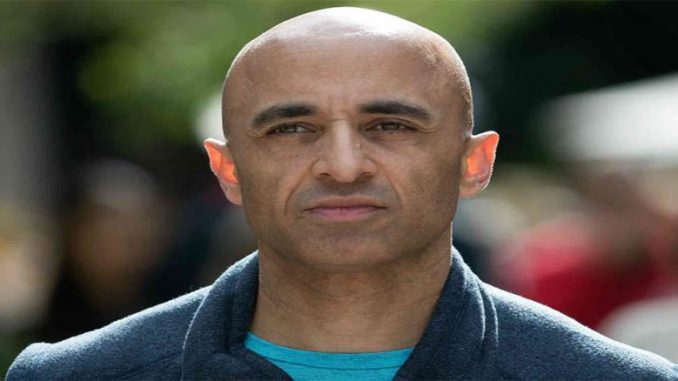
Hackers have released the first series of emails taken from the inbox of the UAE’s ambassador to the United States, Yousef al-Otaiba.
The Intercept reported on Saturday that the emails, released by a group called “Global Leaks”, show a close relationship between al-Otaiba and a pro-Israel, neoconservative think tank – the Foundation for Defense of Democracies (FDD).
The hacked emails, some of which date back to 2014, reveal a high-level of backchannel cooperation between the FDD, which is funded by pro-Israel billionaire Sheldon Anderson, and the Gulf country.
They also appear to show clear collaboration between the FDD and the UAE on a campaign to downgrade the image and importance of Qatar as a regional and global power, including collusion with journalists who have published articles accusing Qatar and Kuwait of supporting “terrorism”.
Ziad Jilani, one of the authors of The Intercept report, told Al Jazeera the emails support previous allegations “that there is a growing axis between some of the Gulf countries, like Saudi Arabia and the UAE, and Israel”.
David Hearst, the Editor in Chief of Middle East Eye, told Al Jazeera the emails laid bare the “mechanism” behind “a very high stakes campaign that is being launched against Qatar”.
Otaiba is well-known figure in US national security circles – he has been called “the most charming man in Washington” – and has participated in Pentagon strategy meetings at the invitation of the defence officials.
The release of the leaked emails comes a week after a cyberattack on Qatar’s official news agency, during which fake remarks critical of US foreign policy were posted and attributed to the Qatari Emir.
Saturday’s email leak includes an exchange in which FDD senior counselor John Hannah – a former deputy national security advisor to Vice President Dick Cheney – complains to Otaiba that Qatar is hosting a meeting of Hamas at an Emirati-owned hotel.
Otaiba responds that the UAE is not at fault and that the real problem lies with the US military base in Qatar.
He writes: “How’s this, you move the base then we’ll move the hotel :-)”
The leak also includes a proposed agenda for an upcoming meeting between the FDD and the UAE government scheduled for June 11-14.
The agenda includes in-depth discussions specifically on Qatar, including Qatar-based Al Jazeera, and its alleged links to the Muslim Brotherhood.
One item on the agenda is: “Al Jazeera as an instrument of regional instability”.
“They actually discussed recasting Al Jazeera as a disruptive network, a network that is causing instability and chaos, rather than recognized good journalism,” The Intercept’s Jilani told Al Jazeera.
Attendees set to take part in the June meeting include former US Secretary of Defense Robert Gates and Mark Dubowitz, CEO of FDD.
Other FDD emails ask for meetings with high-ranking figures including Mohammed bin Zayed – the crown prince who runs the UAE’s armed forces – as well as Mohammed Dahlan, a former strongman of the Palestinian Fatah group who now lives in Abu Dhabi.
A large portion of the emails focus on “U.S./UAE polices to positively impact Iranian internal situation” and to “contain and defeat Iranian aggression”.
Another email in the leak shows the FDD and the UAE looking to pressure businesses to pullout of Iran.
In early March, Dubowitz emailed Otaiba a listing non-US businesses operating in Saudi Arabia or the UAE “looking to invest in Iran”.
“This is a target list for putting these companies to a choice, as we have discussed,” Dubowitz wrote.
Another email shows FDD senior counsellor, John Hannah, requesting a meeting with Mohammad Dahlan, a security adviser to Mohammed bin Zayed al-Nahyan and hopeful future President of Palestine.
Hearst, of the Middle East Eye, told Al Jazeera he believed the leaked emails showed a clear “agenda” by ruling figures in Saudi Arabia, the UAE and Egypt.
They have “seized” on Donald Trump’s presidency in the US, “and now they’re using him as a way of getting the job done, which includes getting rid of Al Jazeera… and also muffling Qatar”.
The UAE twists the US’ arm
The real importance behind the e-mails lies in how much sway the UAE has had in influencing US policy in the Middle East – especially against Iran and Qatar.
The hackers claim that the emails show “how a small rich country/company used lobbyists to hurt American interests and those of its allies.”
In 2013, Otaiba sent regular emails to contacts throughout Washington, praising the overthrow of deposed Egyptian president, Mohammed Morsi.
“Countries like Jordan and UAE are the ‘last men standing’ in the moderate camp,” he wrote, adding that “The Arab Spring has increased extremism at the expense of moderation and tolerance.”
The hacking group said the leaks “reveal how millions of dollars were used to hurt [the] reputation of American allies and cause policy changes”.
The Moscow Connection
GlobalLeaks claims to be connected to DC Leaks, a cyber espionage group which the US Department for Homeland Security (DHS) found to be attached to the Kremlin.
“The US Intelligence Community (USIC) is confident that the Russian Government directed the recent compromises of e-mails from US persons and institutions,” the DHS said in a statement.
Moscow has been at odds with a number of Gulf Arab monarchies over the Syrian conflict. Russia has backed the Syrian President, Bashar al-Assad, whereas a number of Gulf states have allegedly provided arms and support to the Syrian rebels and Islamic State.
It has not been confirmed or verified whether GlobalLeaks is connected to DC Leaks or the Kremlin.
Otaiba’s emails show an effort to build alliances and a focus on Qatar
The night before former U.S. Defense Secretary Robert Gates was scheduled to speak at a high-profile Washington conference on Qatar, for instance, Otaiba wrote him an artfully worded note. “The subject of the conference has been a neglected issue in U.S. foreign policy despite all the trouble it’s causing,” the diplomat wrote. “Coming from you, folks will listen carefully.”
Gates emailed back that he thought he had “the chance to put some folks on notice.”
Otaiba offered to buy the former Cabinet official lunch and passed along a message from his boss back home. “MBZ sends his best from Abu Dhabi,” the ambassador wrote, using a nickname for UAE Crown Prince Muhammed bin Zayed. “He says ‘give them hell tomorrow.’”
The next day, Gates offered a scathing assault on Qatar, excoriating its support for Islamists, at an event hosted by the hawkish Foundation for Defense of Democracies. “The United States military doesn’t have any irreplaceable facility,” he said. “Tell Qatar to choose sides or we will change the nature of the relationship, to include downscaling the base.”
The incident worried U.S. officials. The American ambassador to Qatar, experienced career diplomat Dana Shell Smith, contacted many of the conference speakers beforehand to try to tone down the rhetoric. It appears that her attempt backfired: foundation officials have publicly criticized and mocked her efforts.
The powerful Washington-based foundation features heavily in the Otaiba emails. While many of those messages show the ambassador helping its analysts plan trips to the UAE, they also contain two of the most striking revelations about Otaiba: He explicitly advocated for moving the U.S. base out of Qatar ― something he hasn’t done publicly ― and he discussed the idea of pressuring companies in U.S.-friendly countries to avoid business opportunities in Iran.
UAE, Qatar rivalry
The UAE and Qatar have taken their rivalry public in recent days following a controversial report in Qatari media. Qatari authorities soon claimed that the May 23 story ― which suggested that the country’s ruler, Sheikh Tamim bin Hamad Al Thani, gave a speech describing his respect for Iran, his support for the Palestinian militant group Hamas and his ties with Israel ― was a fake product of a hack. But news sources based in the UAE and Saudi Arabia still suggest that it exposed his true feelings.
Though Qatar and the Emirates are putative allies, they have drifted apart since 2011 because of their differing reactions to the Arab Spring protests that year. As the largely non-violent Muslim Brotherhood movement gained power across the region, Qatar supported it, seeing it as a vehicle for the Middle East’s democratic aspirations. The UAE calls the group a terror front. With a new U.S. administration in power, the time is ripe for one or the other to push for American action in its own interests, according to Huffington Post.
Otaiba’s email leaks are likely to heighten tensions between the two U.S. partners. If the UAE succeeds in damaging America’s decades-old relationship with Qatar, the result could dramatically undermine U.S. goals in the Middle East. The two American partners’ escalating rivalry could worsen conflict in war zones where they support different proxy forces ― notably in Libya, which has become a haven for smugglers, warlords, and terrorists ― while distracting attention from bigger international priorities, like restoring stability in Syria and Iraq after the expected battlefield defeat of the Islamic State. And the UAE strategy could leave the U.S. more wedded to that government’s whims, including its policy of maintaining brittle autocratic rule across the region instead of trying to secure long-term stability by having some level of popular participation.



